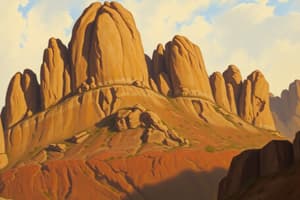Podcast
Questions and Answers
Which type of sedimentary rock is classified based on the transportation of sediment as solid particles?
Which type of sedimentary rock is classified based on the transportation of sediment as solid particles?
- Metamorphic rocks
- Chemical sedimentary rocks
- Organic rocks
- Detrital sedimentary rocks (correct)
What is an example of a chemical sedimentary rock?
What is an example of a chemical sedimentary rock?
- Mudstone
- Sandstone
- Limestone (correct)
- Coal
What defines organic sedimentary rocks?
What defines organic sedimentary rocks?
- Rocks formed from mineral deposits
- Rocks formed from solid particles
- Rocks consisting of carbon-rich tissues (correct)
- Rocks created from volcanic materials
Which rock type is commonly associated with strata and bedding planes?
Which rock type is commonly associated with strata and bedding planes?
Which of the following is not a detrital sedimentary rock?
Which of the following is not a detrital sedimentary rock?
What is the main characteristic of evaporite sediments?
What is the main characteristic of evaporite sediments?
Which type of sedimentary rock can include Chert?
Which type of sedimentary rock can include Chert?
What material primarily composes coal?
What material primarily composes coal?
What primarily causes the formation of sedimentary rocks?
What primarily causes the formation of sedimentary rocks?
Which of the following is NOT a material that sedimentary rocks might economically contain?
Which of the following is NOT a material that sedimentary rocks might economically contain?
What percentage of Earth's outer 16 km is made up of sedimentary rocks?
What percentage of Earth's outer 16 km is made up of sedimentary rocks?
Which of the following features can be found in sedimentary rocks?
Which of the following features can be found in sedimentary rocks?
What type of evidence can sedimentary rocks provide about the past?
What type of evidence can sedimentary rocks provide about the past?
Which raw materials utilized in the construction industry may be found in sedimentary rocks?
Which raw materials utilized in the construction industry may be found in sedimentary rocks?
What is the primary significance of sedimentary rocks besides their economic value?
What is the primary significance of sedimentary rocks besides their economic value?
Which of the following industries does NOT utilize resources obtained from sedimentary rocks?
Which of the following industries does NOT utilize resources obtained from sedimentary rocks?
What defines body fossils?
What defines body fossils?
Which of the following is an example of petrification?
Which of the following is an example of petrification?
What type of fossil involves the addition or substitution of minerals?
What type of fossil involves the addition or substitution of minerals?
Which preservation process involves the transformation of calcite in shells?
Which preservation process involves the transformation of calcite in shells?
What distinguishes trace fossils from body fossils?
What distinguishes trace fossils from body fossils?
Which method of fossilization creates internal and external impressions?
Which method of fossilization creates internal and external impressions?
Why is bedding significant in the context of engineering?
Why is bedding significant in the context of engineering?
Which type of fossils are typically preserved in sedimentary rock?
Which type of fossils are typically preserved in sedimentary rock?
What type of sedimentary structure is characterized by inclined layers?
What type of sedimentary structure is characterized by inclined layers?
What causes mud cracks in sedimentary structures?
What causes mud cracks in sedimentary structures?
Which of the following is NOT a type of sedimentary structure mentioned?
Which of the following is NOT a type of sedimentary structure mentioned?
Which of the following is an example of an evaporite?
Which of the following is an example of an evaporite?
What feature is indicated by ripple marks in sedimentary structures?
What feature is indicated by ripple marks in sedimentary structures?
What chemical compound is represented by the formula CaSO4·2H2O?
What chemical compound is represented by the formula CaSO4·2H2O?
When gypsum is heated, what does it primarily release?
When gypsum is heated, what does it primarily release?
Which sedimentary structure is formed from the activity of seafloor animals?
Which sedimentary structure is formed from the activity of seafloor animals?
Which of the following is a primary use of potash?
Which of the following is a primary use of potash?
Which sedimentary structure is likely to develop in a wetland environment undergoing evaporation?
Which sedimentary structure is likely to develop in a wetland environment undergoing evaporation?
What is the primary characteristic of ripple marks?
What is the primary characteristic of ripple marks?
Which type of rock is formed from the precipitation of dissolved materials?
Which type of rock is formed from the precipitation of dissolved materials?
What kind of evidence might cross-bedding provide in geological studies?
What kind of evidence might cross-bedding provide in geological studies?
Which mineral results from the evaporation of seawater?
Which mineral results from the evaporation of seawater?
What is an alternate name for rock salt?
What is an alternate name for rock salt?
Which statement best describes anhydrite?
Which statement best describes anhydrite?
Flashcards are hidden until you start studying
Study Notes
Sedimentary Rocks
- Sedimentary rocks form from the precipitation, sedimentation, and accumulation of weathered rock material (soil).
- They account for about 5% (by volume) of Earth's outer 16 km.
- Contain evidence of past environments, sediment transport, and past life forms (fossils).
Importance of Sedimentary Rocks
- Sedimentary rocks are economically important because they may contain coal, petroleum, natural gas, iron, aluminum, manganese, fertilizer, and raw materials for the construction industry.
Types of Sedimentary Rocks
- There are 3 types of sedimentary rocks based on the source of the material: detrital sedimentary rocks, chemical sedimentary rocks, and organic rocks.
- Detrital sedimentary rocks are formed from sediment transported as solid particles.
- Chemical sedimentary rocks are formed from chemical sediment that was in solution.
- Organic rocks are formed from carbon-rich tissues.
- These rock types can be interlayered due to changes in the environment.
Basic Rock Types
- Detrital: conglomerate, sandstone, siltstone, mudstone, shale (layered)
- Chemical: limestone (Ca), dolostone (Mg, Ca), chert (Si), evaporite (NaCl, etc.)
- Organic: coal
Sedimentary Structures
- Strata or beds: layers
- Bedding planes: flat surfaces that separate strata, originally horizontal.
- Bedding can create engineering issues if not considered during construction.
Fossils: Evidence of Past Life
- Fossils are the remains or traces of prehistoric life preserved in sediment or sedimentary rock.
- Types of preservation:
- Recrystallization: calcite in shells recrystalizes into a stable form.
- Petrification or Replacement: addition or substitution of minerals.
- Mould: internal and external impressions.
Fossil Types
- Fossils are generally divided into two groups:
- Body fossils: preserved remains of organisms.
- Trace fossils: preserved evidence of organism activity, such as burrows or footprints.
Sedimentary Structures: Types
- Cross-bedding: inclined layers, indicative of current direction.
- Mud cracks: shrinkage on exposure to air, indicates a drying environment.
- Ripple marks: small waves of sand formed by moving water, indicates flow direction.
Chemical Sedimentary Rocks: Evaporites
- Examples of evaporites include rock salt (NaCl), rock gypsum (CaSO4-2H2O), and potash (KCl used as a fertilizer).
- Salt flats are formed by the precipitation of dissolved material as a white crust on the ground.
- Gypsum is a hydrated calcium sulfate (CaSO4· 2H2O).
- Anhydrite is calcium sulfate (CaSO4).
- When gypsum is heated, it releases water and consumes heat.
Studying That Suits You
Use AI to generate personalized quizzes and flashcards to suit your learning preferences.




